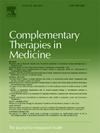Effect of aromatherapy with peppermint, ginger, and lavender on postoperative nausea severity after oral surgery under general anaesthesia: A single-blind randomized controlled trial
IF 3.5
3区 医学
Q1 INTEGRATIVE & COMPLEMENTARY MEDICINE
引用次数: 0
Abstract
Objectives
This study aimed to examine whether aromatherapy with peppermint (Mentha piperita Mitcham), ginger (Zingiber officinale), and lavender (Lavandula angustifolia) reduces the severity of nausea in patients experiencing postoperative nausea after oral surgery under general anaesthesia.
Design
Single-centre, stratified (volatile inhaled anaesthetics used or not and sex, with balanced randomization), single-blind, placebo-controlled study conducted in Japan.
Setting
Hokkaido University Hospital.
Interventions
Totally, 182 patients were randomized into two groups of aromatherapy: aroma group comprising three essential oils—peppermint, ginger, and lavender—each diluted to 1 % (each dose as pure essential oil was 0.01 ml) and control group with purified water only. Of these, 32 patients in the aroma group and 25 in the control group complained of postoperative nausea and were treated with intervention.
Main outcome measures
Change in nausea severity at the onset of postoperative nausea.
Results
Nausea severity before the intervention did not differ between groups. Aromatherapy significantly reduced nausea severity (p < 0.001). The percentages of antiemetics used were 30.77 % and 52.38 % in the aroma and control groups, respectively, with no significant difference. The aroma group showed significantly higher satisfaction (p < 0.001). No adverse events were observed during the study.
Conclusions
This study indicated that aromatherapy with peppermint, ginger, and lavender significantly improved patient satisfaction and severity of postoperative nausea after oral surgery under general anaesthesia. Therefore, given the benefits of aromatherapy, it would be advantageous to consider a combination of measures that include aromatherapy, as one of the multimodal antiemetic measures.
This trial was registered at the Japan Registry of Clinical Trials (jRCTs: 01121002).
薄荷、生姜和薰衣草芳香疗法对全身麻醉口腔手术术后恶心程度的影响:一项单盲随机对照试验
目的:本研究旨在探讨薄荷(Mentha piperita Mitcham)、生姜(Zingiber officinale)和薰衣草(Lavandula angustifolia)的芳香疗法是否能减轻全身麻醉下口腔手术后恶心患者的恶心程度。设计:在日本进行的单中心、分层(是否使用挥发性吸入麻醉剂和性别,平衡随机化)、单盲、安慰剂对照研究。北海道大学附属医院。总共182例患者被随机分为两组芳香疗法:芳香组包括薄荷、生姜和薰衣草三种精油,每种精油稀释至1 %(每次剂量为纯精油0.01 ml),对照组仅使用纯净水。其中,香气组32例患者和对照组25例患者出现术后恶心症状,并给予干预治疗。主要观察指标:术后恶心发生时恶心严重程度的变化。结果干预前两组患者的恶心严重程度无显著差异。芳香疗法显著降低恶心严重程度(p <; 0.001)。香气组和对照组止吐剂的使用比例分别为30.77 %和52.38 %,差异无统计学意义。香气组满意度显著高于对照组(p <; 0.001)。研究期间未观察到不良事件。结论薄荷、生姜和薰衣草芳香疗法可显著改善全麻口腔手术患者的满意度和术后恶心程度。因此,鉴于芳香疗法的好处,考虑将芳香疗法作为多模式止吐措施之一的组合措施将是有利的。该试验已在日本临床试验注册中心注册(jRCTs: 01121002)。
本文章由计算机程序翻译,如有差异,请以英文原文为准。
求助全文
约1分钟内获得全文
求助全文
来源期刊

Complementary therapies in medicine
医学-全科医学与补充医学
CiteScore
8.60
自引率
2.80%
发文量
101
审稿时长
112 days
期刊介绍:
Complementary Therapies in Medicine is an international, peer-reviewed journal that has considerable appeal to anyone who seeks objective and critical information on complementary therapies or who wishes to deepen their understanding of these approaches. It will be of particular interest to healthcare practitioners including family practitioners, complementary therapists, nurses, and physiotherapists; to academics including social scientists and CAM researchers; to healthcare managers; and to patients. Complementary Therapies in Medicine aims to publish valid, relevant and rigorous research and serious discussion articles with the main purpose of improving healthcare.
 求助内容:
求助内容: 应助结果提醒方式:
应助结果提醒方式:


